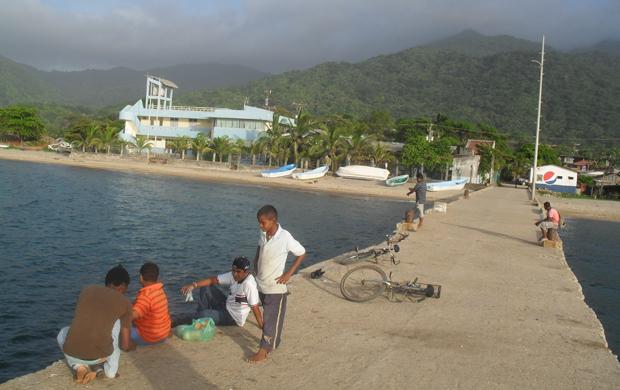Honduras Wants to Build Its Own Hong Kong
People fishing off the main dock in Trujillo, Honduras. (Photo: John Otis)
Honduras has been going through an especially rough patch. A military coup in 2009 ousted its president. Drug violence has helped give Honduras the world’s highest murder rate. On top of that, the country is impoverished. Things are so bad that Honduran officials are considering something drastic. They want to build an experimental city to give the country a fresh start.
Last year, the Honduran Congress passed a constitutional amendment allowing the creation of a semi-autonomous city that would have its own governing rules and a degree of foreign supervision.
The plan was inspired by Paul Romer, a U.S. economist who has been promoting what he calls “charter cities.”
“So I was asked by the President of Honduras who said we need to do this project, this is important. This could be the way forward for our country,” Romer said.
Romer proposes that the new city have a governing charter made up of the best political and economic rules from around the world. Partner nations would provide oversight, guidance and more.
For example, the Honduran judicial system is widely viewed as slow and corrupt. So the island nation of Mauritius has agreed to allow its highly respected Supreme Court to serve as the court of appeals for a Honduran charter city.
Supporters say charter cities could serve as catalysts for reform in the rest of Honduras, similar to the way British-administered Hong Kong provided a blueprint for mainland China’s move to a market economy. Romer says they could also persuade some of the 75,000 Hondurans who immigrate illegally to the U.S. each year to stay home.
“A new city could offer new choices for people,” he said. “There would be the choice of a city they could go to, in Honduras, rather than hundreds of miles away in the north.”
Trujillo, on the Caribbean coast, is one of the oldest towns in Honduras, and there’s not much there. It’s a sparsely populated area of farmers and fishermen. In fact, its backwardness inspired the visiting American writer O. Henry to coin the term “banana republic.” But now, Honduran politicians are considering the area around Trujillo for an ultra-modern charter city.
“We need a system where we can have ships, rail, trucks and planes,” said Dino Rietti, a Honduran architect who is advising the government on the charter city plan. Rietti envisions an international airport and trans-oceanic railroad near Trujillo.
“Is it Utopic? Yes, but also it’s a hope. It’s a new way of thinking,” he said.
A few projects are already going up in anticipation of a charter city. Rietti is managing construction of a combined cruise ship marina and shopping mall in Trujillo.
The marina provides work for hundreds of local residents. Building a whole new city would create many more jobs: Jobs that are badly needed according to Joel Louis, a construction worker at the marina.
“In Trujillo, here in Honduras, a job is very hard to get,” Louis said. “People suffer, suffer a lot for jobs.”
A military helicopter buzzing over Trujillo helps explain why. Government troops are battling drug traffickers and the spike in violence has dragged down the economy. What’s more, the Caribbean coast never fully recovered from Hurricane Mitch in 1998, which wiped out the local banana trade.
William Lorenz, a U.S. developer who moved to Trujillo four years ago, says foreign investors are intrigued by the prospect of a charter city.
“We’ve had Americans come. There are Canadians here who are active. People have been here from Great Britain. We have some interest stirred up in South Korea,” he said.
Money to construct the charter city would come from leasing and selling land to foreign investors. Still, Hondurans are a long way from laying the first brick. The Constitutional amendment allowing for charter cities is being challenged in the Honduran Supreme Court. The country’s former attorney general recently called the plan “21st century colonialism.”
Even supporters, like Rietti, worry about outsized foreign influence and environmental damage.
“You see this beautiful place? You see how beautiful it is? It’s natural. You see children playing. You see people working,” Rietti said.
But given the nation’s downward spiral, Rietti says it may be time for Honduras to try something radically different.
“We are giving to the investors the best that we can,” he said. “Now they have to do the best for the country.”
